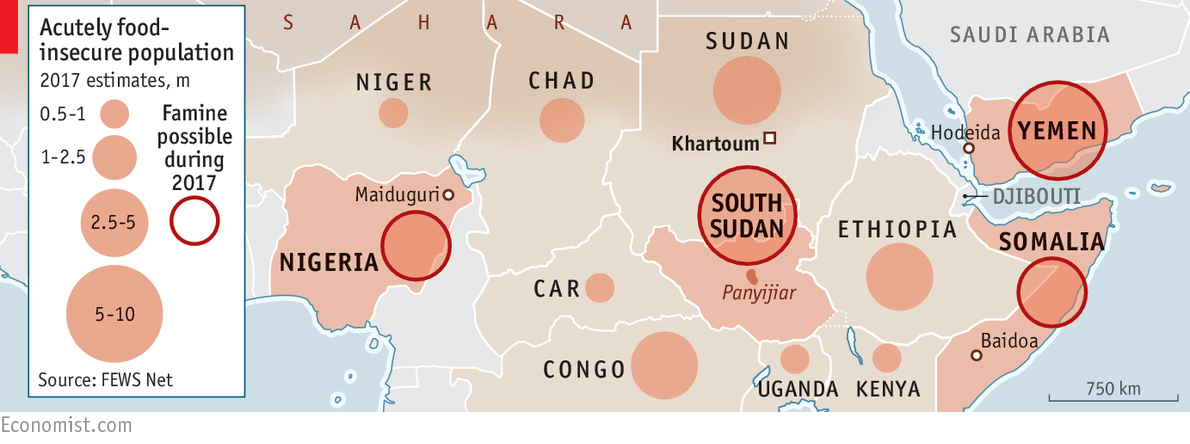 Back in 2002, the United Nations decided that by 2015 the proportion of people who suffer from hunger should be cut in half from 1990 levels. We nearly met this target of a basic human right, alongside the other Millennium Development Goals, yet almost 800 million people (over 10% of the world's population) are still undernourished. In the next iteration, the UN set its sights higher with the Sustainable Development Goals, aiming to end world hunger by 2030. While this seems like a no-brainer in this day and age - how many people would argue that people shouldgo hungry?? - there are a number of reasons unrelated to how many calories farmers produce for why we continue to see chronic hunger and malnutrition, as well as bouts of acute famine. This post touches on two factors and specifically famine, as part of the lead-up to the Live Below the Line challenge in May (and I'm also raising funds for the awesome organization Oaktree, so check it out!).
Back in 2002, the United Nations decided that by 2015 the proportion of people who suffer from hunger should be cut in half from 1990 levels. We nearly met this target of a basic human right, alongside the other Millennium Development Goals, yet almost 800 million people (over 10% of the world's population) are still undernourished. In the next iteration, the UN set its sights higher with the Sustainable Development Goals, aiming to end world hunger by 2030. While this seems like a no-brainer in this day and age - how many people would argue that people shouldgo hungry?? - there are a number of reasons unrelated to how many calories farmers produce for why we continue to see chronic hunger and malnutrition, as well as bouts of acute famine. This post touches on two factors and specifically famine, as part of the lead-up to the Live Below the Line challenge in May (and I'm also raising funds for the awesome organization Oaktree, so check it out!).
So let's start with what should be a relatively straight-forward and objective topic - weather and a changing climate. Food shortages have been attributed to periods of drought, severe rainfall, and pests for millennia. Rainfall changes might spread diseases that wipe out crops, as prompted the Irish potato famine in 1845. The failure of the monsoon in India has taken blame for famines at the end of the 19th century. And while anticipated overdrawn aquifers and more intense storms may undermine crop and livestock production, our fisheries that feed the world's poorest are at risk from rising sea surface temperatures and ocean acidification. Even countries like Australia, with a particularly vulnerable agriculture sector, are not exempt from the impacts. Yet politically stable, wealthy nations have the capacity - that many other countries do not - to minimize acute events that often cause famines by importing food and sending aid to their affected populations.
This leads us to the topic of conflict, which can be both cause and result of food scarcity. This isn't news; back in the early 1990's, researchers argued that conflict and civil strife were the prime suspects instigating famines. A recent article in The Conversation captures the sentiment that famines don't "just happen", but are driven by particular social and political circumstances.
So enter 2017, where there is "high risk of famine in some areas of north-eastern Nigeria, Somalia, South Sudan and Yemen because of armed conflict, drought and macro-economic collapse," according to the Food Security Information Network (FSIN). In the coming year, widespread food insecurity is expected to also pose problems in Syria*, Iraq, Malawi, and Zimbabwe. The region experienced considerable political discontent in the early 2010's, some say spurred on by rising food prices. But here again we encounter the the question of whether food shortages (driven by adverse weather, etc.) provoke conflict or the other way around. An article in The Economist argues that war and violence simmering in these countries made it next to impossible for farmers to cultivate crops to feed themselves and their neighbors, as well as for food aid and supplies to cross border lines. Many of the possible 2017 famines fall into the "avoidable" bucket.
Hunger may seem worlds away for many of us, but it is truly naive to believe that the instability and unrest that is both a contributor and a result of food insecurity is isolated, without far-reaching implications in terms of political security, counter-terrorism, and global food production. In some ways, countries "worlds away" are culpable; for example, the US provided weapons to the Saudis then used to stoke the war in Yemen. It is withdrawing aid to vulnerable regions in Africa. And finally, several countries facing famine are also on the proposed travel ban in the US, a cruel and unfeeling move, but also one way of seeding desperation and resentment.
It's clear that governments are not working in favour of the health and prosperity of their populations, so its more important than ever that we try to support efforts that are attempting to improve the human condition (and ultimately the environment on which we rely).
*I should note that most of this post was written before the most recent attacks in Syria, and the situation there has most certainly escalated to nothing short of a travesty, tragedy, and serious human rights violation!

No comments:
Post a Comment